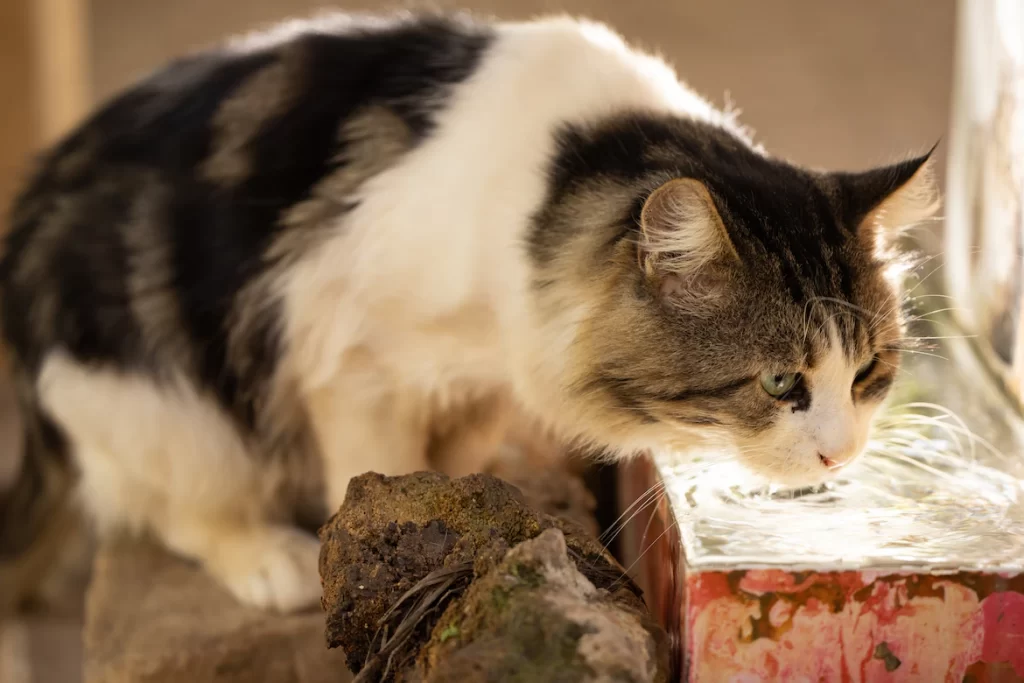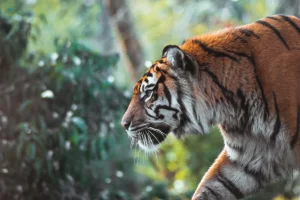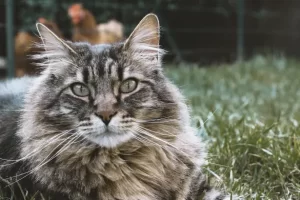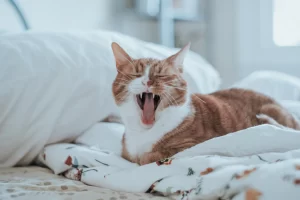Last updated on February 24th, 2023 at 02:54 am

So, you are having in mind “How long can a cat survive without food and water?”. You might be surprised by the answer. Even though cats and people are very different in size, they have a lot in common. We both need to eat healthy food, sleep in a safe place, and drink water to stay alive.
A cat’s survival without food and water depends on a variety of factors such as the cat’s age, overall health, hydration levels, and environmental conditions. Generally, a healthy adult cat can survive without food for up to two weeks, though this can vary based on the individual cat’s health, weight, and age. Without water, a cat can survive for up to three days. Younger cats are more vulnerable than adults as they require more energy and nutrients to stay healthy. Kittens, for example, can only survive for a few days without food and water.
Older cats are also more at risk due to their weakened immune systems and lack of reserves. When it comes to food, cats require a balanced diet of protein, carbohydrates, and fats. Without access to these nutrients, a cat’s body will start to break down its own fat and muscle for energy. This can lead to severe dehydration, electrolyte imbalances, and organ failure.
Water is just as important for cats, if not more so. Cats are prone to dehydration, so access to fresh water is essential. Without adequate hydration, a cat can become severely dehydrated and experience organ failure, electrolyte imbalances, and other medical complications.
There are a lot of different reasons why you might be interested in finding out how long cats can go without water, and we are here to answer all of your questions, including the following ones:
- Do Cats Need Water To Survive?
- How long could they go without eating and drinking?
- How much water should a cat drink each day?
- What happens to cats if they don’t eat or drink for too long?
- How to tell if a cat has not had food or drink for a while?
- Why my cat suddenly stops eating?
We’ll cover everything you need to know to keep your cat healthy and hydrated, starting with the basics. Let’s dive in!
Why do cats hate water?
Cats are known for their aversion to water, but why? There are several possible explanations for why cats may not like water, but the truth is that it depends on the individual cat. Some cats may have a more negative experience with water than others, while some cats may have no issues with it. The first possible explanation is that cats are descended from desert-dwelling ancestors and may not have evolved to be able to swim. Because cats are not natural swimmers, they may have an instinctive fear of water. Furthermore, cats have a thicker fur coat than most animals and this can make them feel uncomfortable when wet.
Another possible explanation is that cats’ sense of smell is much more sensitive than ours and they may not like the smell of water. The smell could be off-putting to them, or they may be able to detect something in the water that we cannot. Additionally, cats may not like water because they are not used to it. Cats are generally solitary animals and may not be used to being exposed to water like other animals. If they have never been exposed to it, they may not know how to react and may be scared.
Aversion to water is not a characteristic shared by all felines. The majority of cat breeds, including Abyssinians, American bobtails, American shorthairs, Bengals, Maine coons, Manx cats, Norwegian forest cats, Turkish Angoras, and Turkish Vans, are known to enjoy the company of water. In addition, regardless of how they feel about getting wet, cats require a lot of water to drink.
Do cats need water to survive?
Yes, cats do need water to survive. Just like humans, cats need water to stay hydrated and healthy. Not drinking enough water can lead to health issues such as dehydration, kidney problems, urinary tract infections, and constipation. Water is essential for cats because it helps keep their body temperature regulated, aids in digestion, and helps flush out toxins. It also helps keep their coat and skin healthy and soft. Water helps cats metabolize proteins, fats, and carbohydrates, which are essential for providing cats with energy.
The situation is slightly different for pet cats. Veterinarians frequently recommend wet food as the primary energy source because it contains a lot of moisture and will prevent urinary and kidney issues caused by a lack of moisture. Cats who eat primarily wet food may not drink much because they get enough water from their food.
On the other hand, cats that only eat dry food require more water because the food they eat contains very little moisture. Also, if the cat does not drink water from its bowl, dry food can cause urinary and kidney problems. The bottom line is that cats aren’t usually interested in drinking water. Nonetheless, their bodies require moisture to function correctly.
How long can a cat survive without food and water?
While a cat can survive for up to two weeks without food, it can only survive for three days without water. Cats will likely only survive three to four days without food if they do not have a consistent source of protein, regardless of whether they have access to fresh water. On the other hand, cats are obligate carnivores, meaning they must eat meat to survive.
A cat’s organs will begin to shut down after three to four days without food. Dog and human livers can support the body’s energy stores, allowing us to go more extended periods without eating. The liver of a cat lacks this capability. As cats lose weight due to a lack of nutrition, the body’s fat stores begin to infiltrate the liver.
A life-threatening complication known as hepatic lipidosis occurs when a cat does not consume enough calories to replace fat stores with energy, resulting in liver failure. Cats should never be left alone without access to adequate food and water. If you must leave town, board your cats or hire a pet sitter to ensure their needs are met while you are gone.
How long can stray cats survive without food and water?
Stray cats have a difficult time surviving without food and water. Depending on the time of year, and the environment, a stray cat can survive from a few days to a few weeks without food and water. In warm climates, a stray cat can survive without food and water for up to two weeks. Though cats are able to survive without food for a longer period of time than dogs, they can still become weak and dehydrated after a few days without water. Cats will also become more susceptible to disease and infection without a regular source of food and water. In cold climates, a stray cat can survive without food and water for up to five days. Cats are able to survive colder temperatures for longer periods of time than dogs, but without food and water, a cat’s body will begin to use.
How much water should a cat drink each day?
The answer is, it depends on a few factors. Cats require more water than other animals because they are more prone to dehydration, but the exact amount of water a cat needs can vary depending on things like age, size, activity level, health condition, and diet.
Cats, on average, require 3.50 to 4.50 ounces of water per five pounds of body weight per day. So, on average, a 10lb cat will need approximately 9oz (or about a glass of water) per day. This amount can increase if the cat is in a hot environment, is pregnant, is nursing, is elderly or ill, or is eating a dry food diet. Cats that are eating wet food are likely to get enough water from their diet, but it is still important to make sure they have access to additional water.
You shouldn’t be concerned if your cat isn’t drinking as much as the daily recommendation. Cats usually get their water from their food, especially wet food.
Wet food contains 80% or more water, whereas dry food contains only 10% moisture. This means that cats fed wet food may require very little additional moisture, whereas cats fed dry food may require more.
What happens to cats if they don’t eat or drink for too long?
Cats, like humans, require a plentiful supply of water and food to survive. Drinking little or no water will harm the cat’s health. Furthermore, it will frustrate you, especially if you don’t know how to handle the problem. Here are some issues if your cat stops eating and drinking for too long.
- Your cat will become dehydrated if she does not drink enough water yet continues to urinate often. Her strength will suffer due to the loss of extra fluids and nutrients from her body.
- When a cat becomes dehydrated, she may get constipated, vomit, have a dry mouth, or have an elevated heart rate.
- Finally, your cat will become feeble. She will also become agitated as a result of exhaustion and thirst.
- In the absence of water, the cat will suffer from hepatic failure. Her muscles will catabolize, leading to a long but agonizing death.
When you leave your cat alone at home, it is critical that you provide plenty of food and water. Cats rarely survive if they are left without water for an extended period of time at home. Confirm twice that your cat’s food and water are readily available.
How to tell if a cat has not had any food or drink for a while?
As part of your cat’s everyday diet, make sure they get adequate water. If the cat does not drink enough water, they may get dehydrated.
Dehydration symptoms in cats include:
- Energy depletion.
- Panting.
- Decrease in their appetite.
- The eyes are sunken.
- Gums that are tacky and dry.
- Decrease in their grooming habits.
- Lose weight.
Skin tenting is a helpful test for determining whether or not your cat is dehydrated. To do this, gently pull up a tiny bit of your cat’s skin under its shoulders and let go.
If your cat’s skin remains in a tent position and does not fall back down, this could indicate severe dehydration. The skin will rapidly snap back into place if your cat is hydrated. If the skin slowly slides back down, your cat may be dehydrated. In such instances, you should seek immediate medical attention for your cat.
Why does my cat suddenly stop eating and drinking?
Cats typically discontinue drinking and eating for one of two reasons:
Reasons Based on Behavior
You may be wondering what is causing your cat to quit drinking water or to drink very little. Cats are sensitive creatures and may refuse to drink for various behavioral reasons.
Your cat may object to the style or size of the water bowl and its position. Any changes in the surroundings can cause a cat to stop drinking.
Some cats will also refuse to drink if the water isn’t fresh. They may also be hesitant to drink from a bowl positioned against a wall because they believe it will put them in danger. In addition, the detergent you use to clean the bowl may have an unpleasant odor.
Health Concerns
Drinking water may become problematic if your cat has dental disease or an inflammation of the mouth due to the pain it produces. Furthermore, cats with underlying health concerns such as diarrhea, renal diseases, hyperthyroidism, and diabetes lose water more quickly. They may be too ill to drink adequate water.
It is essential that you always pay attention to your cat’s eating habits since they might provide you with some insight into how your cat is feeling at any given time. Suppose you observe any changes in how your cat eats. In that case, you should get in touch with your veterinarian as soon as possible to determine the origin of the issue. On the other hand, if you discover that your cat is not eating, you should investigate why.
What are the risks if my cat stopped drinking and eating?
Water, which accounts for over 60% of your cat’s body weight, supports most of your cat’s critical metabolic functions.
Dehydration is one of the most dangerous consequences of not giving your adequate cat water. Dehydration occurs when your cat expends more fluids than they consume, resulting in a water and electrolyte imbalance in the body. As a result, their bodies become unable to function correctly.
Other than a lack of water, dehydration can be caused by various circumstances. Dehydration can be caused by underlying health issues or drugs, for example.
Inadequate water intake has the following consequences:
- Electrolyte imbalances are severe.
- Blood and oxygen delivery to bodily organs is reduced.
- Food digestion is poor.
- Toxin buildup in the body.
- Reduced Energy.
- Organ dysfunction.
- Poor skin health.
- Male cats have a higher chance of urethral obstruction.
- Death.
What should you do if your cat stops eating and drinking?
Cats may be picky animals. Cleaning their food and water dishes may be all required to get them to eat. Similarly, your pet may reject her feeding bowl if you’ve recently moved to new cat food. Cats will usually consume fresh food if they are hungry enough. However, if your cat continues to refuse to eat and drink after 24 hours, it is necessary to consult a veterinarian. Dehydration and starvation can have grave repercussions, and you should never gamble with your pet’s health.
Conclusion
Now you know that your cat can survive without food for up to 2 weeks but can only survive without water for only 3 days. Water and food are necessary for all living things to stay alive. Bad things happen to your cat’s health when your cat doesn’t drink enough water or live without food for days. As you now know, Cats who are dehydrated might have diarrhea, throw up, or have a fast heartbeat. If the cat doesn’t get any water, its liver will fail, and its muscles will break down.
To avoid these from happening, make sure that you provide your cat with enough water and food supply. Make sure that it is clean too. If you suspect that your cat is dehydrated, take him/her to the veterinarian as soon as possible. Remember, our cats are not able to say what they are feeling, that’s why we need a veterinarian to make sure that they are okay.


